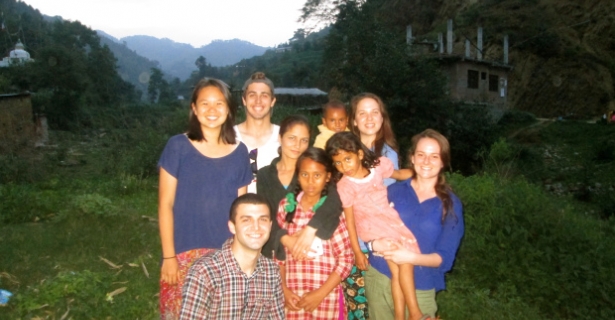Hello from Kathmandu! We arrived back in the capital a few days ago, after having spent the past three weeks living in the village of Manadhova, Rayale in the Kavrepalanchowk District of Nepal. While relatively close to Kathmandu (no more than a few hours by bus) and the most developed PHASE project area, it was still a big change for all of us GROW interns. The natural beauty of the village we lived in was awe-inspiring: rolling hills covered in robust green forest alongside miles upon miles of rice paddies. Often, women in brightly colored Nepali clothing worked in the rice paddies from dawn to dusk, creating breath-takingly bright and colorful views. The sense of community and serene environment was a very welcome change from the dusty and loud streets of the city.
Our day-to-day experiences were based primarily in two local government schools: Nick and Morgan worked with the Shree Bhalchandra School and Reilly, Emily and Linda worked with the Shree Shanti Niketan School. In each school, we worked with students from grade four to grade ten in multiple contexts, including teaching English and creative writing as well as establishing and directing extracurricular child clubs, which are similar to student governments. Child clubs are school-run student groups endorsed by the Nepali government that act as forums for conversation and action in areas such as child rights, child protection, youth empowerment and leadership, health education, and extracurricular activities.
After being in the schools for a few days, we realized how different the Nepali teaching methods and education system are overall from what we experienced in our own elementary and middle schools. In the Nepali schools we observed a heavy reliance on rote learning in English classes, and much less focus on creativity, open-ended activities, and active participation. Part of the PHASE education development program is to improve teaching methods with the help of highly-trained traveling PHASE staff. We were able to sit through certification sessions, where PHASE teacher-trainers observed lessons taught by schoolteachers and provided feedback. Following the session, several teachers were newly designated as mentors with the responsibility of using their new skills and knowledge to further PHASE education initiatives with their fellow faculty. Watching this process allowed us a glimpse into how exactly PHASE works to improve educational practices in these rural schools.
In addition to working in the local schools, were also able to experience the livelihood and health aspects of PHASE programs by spending time with on-the-ground PHASE staff in their respective roles. Kriti, an Auxiliary Nurse Midwife in-training allowed us to observe her in the health outpost multiple days, and Kabita, a livelihood specialist, came out to Rayale to guide us around local “practical plots” that were grown with the help and training of PHASE staff. Even though our time spent experiencing PHASE’s health and livelihood sectors was comparatively short, we were grateful for the opportunity to gain a fuller understanding of the PHASE approach to breaking the poverty cycle.
Experiencing firsthand PHASE’s multifaceted model of development in rural communities allowed our team to see how the three programs (education, livelihood and health) work together to create a sustainable solution in the project areas. Isolated attention on any one of the three programs would not effectively break the cycle of poverty; the best quality education will do little to help a child who is too hungry to concentrate or absent due to illness. Likewise a child in good health can never reach his maximum potential if the school system is failing him. Realizing the interconnectedness of these three aspects while in the villages helped our team fully understand the PHASE mission of achieving self- empowerment by engaging communities rather than providing a one-time delivery of external aid.
We worked with PHASE not to implement new infrastructure or an educational program project during our three weeks in the village, as traditional volunteering expeditions might. Instead, we used our time there to learn about the needs and mission of the schools and PHASE to be better able to make an impact through advocacy and fundraising once we return to the US. The model of this approach, termed “service learning,” is aimed to allow us to make the most of our relatively short time in Nepal by setting achievable and practical learning goals that focus on future sustainability in our partnership with PHASE. While the internship was focused on the idea of service learning, we also felt that, unexpectedly, we perhaps had made a lasting change within the schools. In a small way, we were able to show teachers active participation activities, which were not widely used before, and we, hopefully, made a lasting impression on the children and families that we met.
As our GlobeMed at Tufts partnership with PHASE began just this last academic semester, this trip was for the GROW interns, GlobeMed at Tufts, and even PHASE Nepal, a learning experience. We went into this internship knowing that we were acting as a sort of experiment - to see what worked and what didn’t for the GROW internship. We were also acting as the initial bridge between our two organizations, charged with laying the foundation and cultivating a relationship for a long-term partnership with PHASE. In our opinion, it was amazing. We are extremely lucky to have worked with the dedicated and compassionate PHASE Nepal staff, and also to experience first hand the communities they work in. In a joint effort to improve our relationship and future GROW internships, we have begun discussing plans for both the upcoming academic year in terms of fundraising, advocacy, and the GROW trip in 2015. Our aim is that future GROW interns will continue to facilitate progress toward child club goals, with a specific focus on improving student health conditions and knowledge, including implementing standard health checks. If our trip has been any indication of what is to come for the GlobeMed at Tufts and PHASE relationship, the future looks bright.


Add new comment